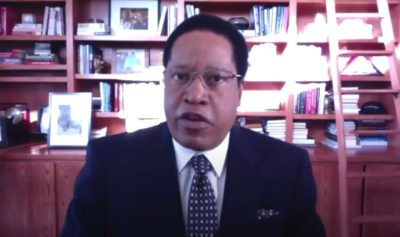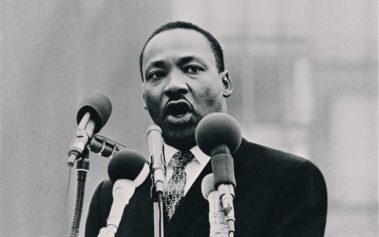In August, Los Angeles radio host Larry Elder made a shocking claim during an interview with CNN’s Brooke Baldwin.
When Baldwin launched a discussion about the protests and riots in Ferguson, Missouri, Elder insisted that racism is not a major problem in America.
In fact, he stated that if Black America were its own separate nation, “it’d be the 15th wealthiest nation in the world.”
Despite attempting to support the claim with a report from 2011, it seems the myth that Blacks can easily thrive in this so-called “post racial” America without facing any disadvantages or racially charged obstacles has been busted.
Elder tried to defend his claim by pointing out that African-Americans had a total spending power of $836 billion.
That certainly is an impressive number, but Theodore R Johnson of The Atlantic was quick to point out a major logical fallacy in Elder’s argument – spending power does not equal wealth.
In a nation where institutional racism has led to segregated housing, disproportionately high poverty and incarceration rates in Black communities, conditioned bias during job screenings and interviews and much more, Black America’s impressive spending power still wouldn’t rank as a successful, wealthy nation.
The Atlantic painted two pictures of Black America based on the statistics in the study.
“The first is of a strong nation with considerable manpower and purchasing power,” The Atlantic reports. “The second is of a troubled, fragile state suffering from socioeconomic disparities and structural subjugation in ways that degrade life, liberty and the pursuit of happiness.”
As it turns out, Black Americans have a median wealth that ranks below Mexico, China and Brazil.
“According to the U.S. Census and the Credit Suisse Global Wealth Databook, the median wealth per black American adult is $4,955, below the median wealth per adult in Mexico, China and Brazil,” the BBC reported. “And in the United States, the average poverty rate is 15.1 percent overall, versus 27.4 percent in the black community.”
Johnson went on to point out that “Black household wealth is just over the median wealth of an adult in Palestine.”
So what Elder seemed to miss in his analysis of Black America as a nation is the fact that spending power alone is not enough to determine a country’s success.
While Black Americans serve as a powerful contribution to the success and wealth of America as a whole, separately they are still struggling with serious disadvantages that have formed from hundreds of years of slavery and discrimination.
“As for the belief that Black America is an immense, multifaceted asset to the United States, his instincts were right,” Johnson explained. “Black Americans boast enormous capital that has been exploited over the course of the nation’s history and has yet to be fairly and fully employed to increase prosperity for all Americans.”


